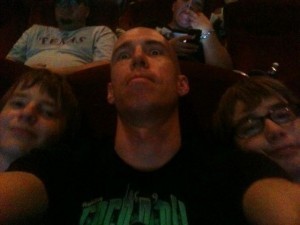This Week in Word of the Day – 06/16/2013
codger \KOJ-er\, noun:
an eccentric man, especially one who is old.
Of course the old codger was right, but who wanted to believe that the charming, little dragons shipped in from New Zealand were actually demons from the fourth ring of Hell emerging from the sulfuric pit of despair to usher in the 1000 year reign of the Dark Lord? Even after the truth came to light and the quirky Vietnam Vet became a media celebrity known for his crazed rants that fanned the resistance spirit organizing to beat back the forces of Hell spewing out from the bowels of the Earth, the tiny dragons continued to be the hottest gifts of the Christmas season.
spelunk \spi-LUHNGK\, verb:
to explore caves, especially as a hobby.
Christian’s father towered over the family as an icon of American manhood, celebrity among celebrities, a charisma so vast and overwhelming that it defined the age. The only reason Christian recognized his father when he surfaced from his glamorous life and stumbled through the front door was the man vaguely resembled the one standing next to Christian and his mother in dozens of family portraits presented prominently throughout the living room, dining hall, entrance, but not his mother’s bedroom.
When his father asked, through a haze of cognac, if Christian wanted to go spelunking in Turkey, Christian volleyed back a rash “yes!” It was the first time his father asked if he wanted to do anything together.
Nevermind the chilling trepidation Christian faced in dark and refined spaces, it was a chance to form a bond with his father.
Three weeks later, Christian was found crawling out of the the jagged maw of a flooded cave, starved, frozen to the bone and climbing out of death’s embrace.
The adventure tourists swiped the blood from Christian’s scalp and his arms, lifting his shirt, looking for the injury.
“It’s not mine,” Christian managed weakly. “It is my father’s.”
Christian awoke the next day, his right wrist handcuffed to a gurney. The trial was a sham, the judge playing the part of the ringmaster, the jury assumed the roles of clowns and his lawyer a lion tamer trying to whip back the public’s outrage that a child dared to steal away a god of the silver screen.
Christian knew the truth, he knew what he saw in his father’s eyes those last, manic hours, but legend is what the people wanted. So, when Christian was called to testify, legend is what he gave them.
sward \swawrd\, noun:
1. the grassy surface of land; turf.
2. a stretch of turf; a growth of grass.
verb:
1. to cover with sward or turf.
2. to become covered with sward.
As pirates swept through the ship, gunning down the crew and combing the cabins for anything worth stealing, Sergio fled to the deck. Under a swarm of bullets, Sergio tumbled overboard and plunged into the sea.
Blackness overtook him.
He awoke to a woman’s lips pressed to his. He startled and pushed the weight off him, rolling away as he heard a splash nearby.
He found himself on a 13 foot sward flanked on all sides by the vast, restless sea. Storm clouds rolled along the sky into every horizon. The small island was overgrown with a thick, leafy grass. A rocky reef encircled the grass on all sides, buffeting it from the waves with a 20 foot moat in-between.
Sergio noticed a tuft of red hair gently breaking the surface of the moat. Tentatively, it rose, revealing a pale green forehead, emerald eyes, purple lips and a thin neck with gills discretely gasping behind her jawline.
The woman allowed a nervous smile, then tossed a dead fish onto the grass.
“For you, husband,” she said, dipping her head.
“Oh,” Sergio responded, dumbly.
The woman dipped underneath the water, disappearing for several seconds before surfacing 20 feet on the other side of the rocks. She waved and he waved back. The woman beamed a smile and submerged, leaving Sergio alone and suddenly in love.
“Oh.”
xanthic \ZAN-thik\, adjective:
1. of or pertaining to a yellow or yellowish color.
2. Chemistry. of or derived from xanthine or xanthic acid.
Xanthic mist crept across No Man’s Land, ushered in by sirens and panicked shouts. Men scrambled for masks and climbed out of the trenches to lay low in the mud while the sickly fog overtook them. The invalid welcomed death from their beds like they were receiving a long lost friend.
Ensign Callow stood up and peered into the haze, catching brief glimpses of the dreary fields shorn of all life save the thousands of young men, bitter and tarnished from months of an ugly and unproductive war. They expected the rattle of machine gun nests, but were instead greeted with a seductive peace.
A laugh reverberated through Callow’s gas mask. His compatriots glanced up at him, always expecting a joke from the son of a tavern owner always quick with a limerick or bawdy tale from his time as a bed-turner at a brothel.
Callow stepped toward the German lines, swiveled to face his friends. He ripped off his gas mask and flashed a smile.
“Gentlemen, I am retiring from the battlefield!”
Callow turned away and sprinted toward the enemy trenches, the mist twirling about him. A smattering of shots rang out, but Callow was untouched until he leapt, belly-first into a trench, mustard gas splashing up like water.
diglossia \dahy-GLOS-ee-uh, -GLAW-see-uh\, noun:
1. the widespread existence within a society of sharply divergent formal and informal varieties of a language each used in different social contexts or for performing different functions, as the existence of Katharevusa and Demotic in modern Greece.
2. Pathology. the presence of two tongues or of a single tongue divided into two parts by a cleft.
After 20 years in the field as an Alabama insurance agent, Ashely learned that embracing the diglossia of the community allowed her to slip seamlessly into any home or business, taking on the local dialect to whatever degree necessary.
Though she was a small wisp of a woman, barely tipping the scales at 90 pounds, she was immovable with a will of cast iron, but a heart vast enough to welcome in all who walked into her office. Insurance is an emotional business and Ashley specialized in the difficult balance between empathy and business discipline.
“These folks just need someone to yell at, from time to time. Nature’s been bullying them, they feel helpless, lost. They need someone to understand they’re hurting real bad, but they are too proud to admit it. They come to me, heated and boiling over, we talk it out. These are all good people, from top to bottom. All they want is a willing ear when life knocks them off their feet and a hand to pull them back up off the ground. That’s what I do.”
palinode \PAL-un-nohd\, noun:
1. a poem in which the poet retracts something said in an earlier poem.
2. a recantation.
Sydney’s sullen nature was never a closely guarded secret in the small bedroom community where the boy pasted hundreds of copies of his poems regularly on windows, bathroom walls, light posts, and whatever other surface was left unguarded for over thirty seconds.
At first, the novelty of a tortured and talented young scribe caused the town elders to withhold punishment for defacing public and private property.
“I do believe he gives us a smidgen of credibility, don’t you think?” the fussy mayor known for her love of powder blue power suits asked in a meeting.
Enough people agreed to convince the sheriff to look the other way until the boy’s creative burst ran its course.
This process would take years, as it turned out, with long screeds about the unnatural bond of monogamy, the myth of “true love”, and the evils of corporate agendas of beauty being his most favored subjects.
But, one mild spring morning, the town awoke to Sydney’s most ambitious overnight pasting to date. 437 copies of a twenty-three line palinode, shedding the brooding and disenfranchised tone of the past for a worshiping ballad to the act of love.
Even the crusty old minister was thrilled Sydney finally got laid and whoever this mystery lover was, he/she did the town a great service.
mishpocha \mish-PAW-khuh, -POOKH-uh\, noun:
an entire family network comprising relatives by blood and marriage and sometimes including close friends; clan.
The hastily betrothed couple stood before their mishpocha like war criminals. The matriarch chewed bitterly on a tobacco leaf as the household held their tongues.
“But we are in love,” the bride announced defiantly.
“You are a fool,” the matriarch spat back. “Remember, we have been here before. The trouble you have brought to this family.”
“We are in love,” the young man echoed, but with less conviction.
The matriarch smiled, spit into a spittoon and dabbed juice off her chin.
“Life will come for you soon. As it always does. You are children before a vengeful world, so when it strikes, we shall see what this ‘love’ is truly made of.”




